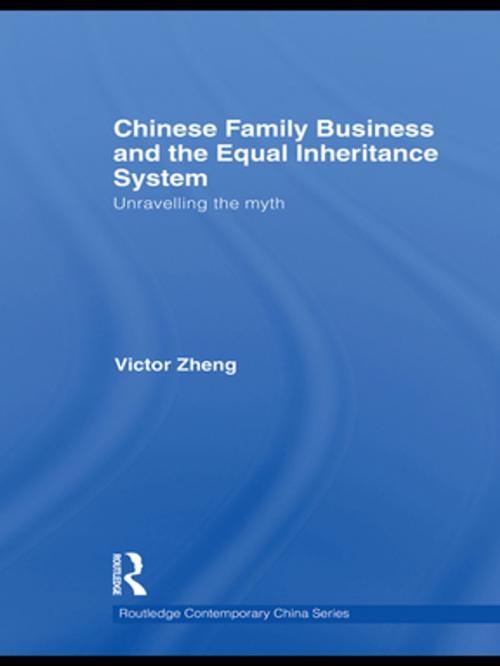Chinese Family Business and the Equal Inheritance System
Unravelling the Myth
Business & Finance, Economics, International, Nonfiction, Social & Cultural Studies, Social Science, Cultural Studies, Ethnic Studies| Author: | Victor Zheng | ISBN: | 9781135172145 |
| Publisher: | Taylor and Francis | Publication: | December 17, 2009 |
| Imprint: | Routledge | Language: | English |
| Author: | Victor Zheng |
| ISBN: | 9781135172145 |
| Publisher: | Taylor and Francis |
| Publication: | December 17, 2009 |
| Imprint: | Routledge |
| Language: | English |
This book disputes the traditional argument that the equal inheritance system hinders the growth of Chinese family business, approaching this not only in terms of economic capital, but also in terms of human capital such as education and leadership, and social networks.
Zheng argues that most of the family business patriarchs only focus on the passing on economic capital, but give little attention to human capital and social capital when the come to the stage to transfer control to the next level. It further elaborates that the equal inheritance system itself isn’t the destructive force that weakens family business competitiveness, but can assist economic development by generating dynamism and capital.
Based on extensive primary research, the work discusses how equal division encourages sibling comparison, analysing how such comparisons initially generate stress and anxiety but will ultimately galvanize competition, benefiting the business. The author also assesses how family division can offer initial economic human and social capitals that can motivate siblings to start their own businesses and be free from the subjugation sometimes associated with a family firm. Through the evaluation of these issues the book argues that the equal inheritance system can be regarded as the origin of the self-employment mentality, which not only fosters the growth of Chinese family business by plays crucial role in promoting economic development.
Providing a valuable contribution to the field, this work will be of great interest to all scholars of Chinese and Asian business.
This book disputes the traditional argument that the equal inheritance system hinders the growth of Chinese family business, approaching this not only in terms of economic capital, but also in terms of human capital such as education and leadership, and social networks.
Zheng argues that most of the family business patriarchs only focus on the passing on economic capital, but give little attention to human capital and social capital when the come to the stage to transfer control to the next level. It further elaborates that the equal inheritance system itself isn’t the destructive force that weakens family business competitiveness, but can assist economic development by generating dynamism and capital.
Based on extensive primary research, the work discusses how equal division encourages sibling comparison, analysing how such comparisons initially generate stress and anxiety but will ultimately galvanize competition, benefiting the business. The author also assesses how family division can offer initial economic human and social capitals that can motivate siblings to start their own businesses and be free from the subjugation sometimes associated with a family firm. Through the evaluation of these issues the book argues that the equal inheritance system can be regarded as the origin of the self-employment mentality, which not only fosters the growth of Chinese family business by plays crucial role in promoting economic development.
Providing a valuable contribution to the field, this work will be of great interest to all scholars of Chinese and Asian business.















